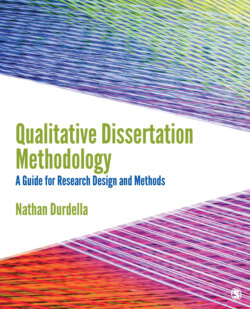Читать книгу Qualitative Dissertation Methodology - Nathan Durdella - Страница 7
На сайте Литреса книга снята с продажи.
Purpose of Qualitative Dissertation Methodology
ОглавлениеQualitative Dissertation Methodology: A Guide for Research Design and Methods integrates the unique dimensions of qualitative research approaches with a dissertation research guide, supporting doctoral students and faculty who supervise dissertation research through the development of a qualitative methodology for dissertation studies. I hope that the book conveys the idea that designing and writing a qualitative dissertation methodology chapter can be done! As a guide-in-action resource—within the context of differing approaches, intricate complexities, and unique facets of dissertation methodology—the central outcome of the book is a draft methodology chapter for a doctoral dissertation that uses qualitative research design and methods. As a guide for individual students and faculty dissertation advisors or a textbook and supplementary resource, especially in doctoral-level courses and workshops in dissertation writing, design, and methods, there is a range of uses for the book. Indeed, students or faculty can pick up the book to support a specific task in constructing their dissertation methods chapter qualitatively or approach writing their dissertation methodology more generally. As a text for a course, the book can be assigned in doctoral writing courses and dissertation seminars—from dissertation proposal preparation courses to yearlong, pro-seminar-type course—and semester-long dissertation writing programs or short-term “boot camp” workshops.
The book offers doctoral students in education and other applied professional fields and social science disciplines a comprehensive guide to conceptualize, design, and write a qualitative methodological framework for their dissertation. Presenting a section-by-section approach to thinking about and writing a qualitative methodological framework in dissertation studies, the book combines components of dissertation advising and writing with social science research concepts. This approach contextualizes research design and methods within the conventions of the dissertation—serving as a guide to plan for and write thesis and dissertation methodology, a key area of need in doctoral programs today. In fact, some of the top areas where I see students challenged as they begin the dissertation research process is in the understanding and application of research design, the connections between components in a dissertation methodology, and the organization of a dissertation methodology chapter. Further, I observe challenges among students with negotiating and managing relationships with dissertations chairs and committees—often related to decisions about methodology or related activities that emerge from methodological decisions: recruitment, data collection, and data analysis. While current texts serve to support dimensions of the thesis and dissertation research process, I struggle to find a comprehensive text that offers master’s and doctoral students in applied social science fields a complete resource to guide them through the development of their methodological framework.
Of course, approaches to dissertations and dissertation methodology chapters vary, and disciplines tend to require slightly different formats or contents in dissertations. Within the methods chapter, for example, some programs require data collection instruments be presented separately from data collection procedures whereas other programs treat them as a single element and present them together. While approaches vary, programs where monograph or book-length dissertations serve as the culminating research experience of a course of study leading to the terminal degree tend to rely on the five-chapter or similar format—and in the middle of the five chapters lies in methodology. The common elements of a methodological framework in a dissertation generally follow a brief introduction: research design or tradition, research setting and context, data sources and research sample, data collection instruments, data collection procedures, and data analysis procedures. Further, whether part of a broader discussion of trustworthiness and quality or as a standalone section, an exploration of researcher roles and strategies to mitigate researcher bias and participant reactivity can accompany dissertation methodology in qualitative research. Against the backdrop of the varying dissertation formats that students and faculty use, this book accounts for differences in programmatic approaches and is intended to address the unique needs to conceptualize, design, and write a qualitative dissertation methodology of students and faculty alike.
